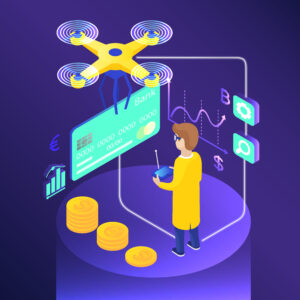The banking business is not an exception to how artificial intelligence (AI) is changing several industries. Though banks have been using AI for decades at various levels, they are increasingly utilizing its power to improve operational efficiency, offer personalized customer experiences, and effectively combat fraud. This trend may be attributed to cross-industry pressure or a desire to remain relevant.
This article will look at actual cases of how artificial intelligence (AI) is assisting banks in making major progress and changing the way that financial institution’s function.
Intelligent Chatbots: Chatbots with AI capabilities have completely changed the banking sector’s customer service model. These virtual assistants are capable of handling a variety of client inquiries, offering prompt support, and carrying out transactions. For example, Bank of America unveiled “Erica,” a chatbot that uses natural language processing to help users with their financial needs. In addition to helping with bill payments and balance inquiries, Erica provides individualized financial insights and planning advice. Banks can boost engagement and customer service around-the-clock by utilizing AI.
Fraud Detection and Prevention: AI is essential for identifying and stopping fraudulent activity, which is a constant source of worry for banks. To detect possible fraud, sophisticated artificial intelligence systems examine vast amounts of data, including transaction history, consumer behaviour, and patterns. An AI-driven fraud detection system was put in place by JPMorgan Chase, which resulted in a 95% decrease of false positives and a more accurate identification of fraudulent activity. Banks can improve their security protocols and shield consumers from financial crime by utilizing AI.
Risk Assessment and Credit Scoring: Artificial intelligence (AI

)-powered risk assessment methods are revolutionizing bank lending. AI algorithms are capable of effectively assessing creditworthiness and making data-driven lending decisions by examining enormous volumes of data, including financial documents, income sources, and credit history. ZestFinance, for instance, uses machine learning algorithms to evaluate credit risks for marginalized groups, allowing banks to give credit to people who were previously denied it. AI-driven risk assessment increases financial inclusion while improving efficiency and empowering banks to make wise lending decisions.
Personalized Banking and Financial Advice: With the use of AI, banks may provide their clients with individualized financial advice and personalized banking experiences. AI algorithms can produce tailored recommendations and financial planning strategies by evaluating consumer data, which includes spending habits, investment choices, and life events. The AI assistant Eno from Capital One uses client data to deliver real-time insights like detecting repeat charges or strange account activity. Such tailored support builds long-term partnerships and improves client engagement.
Trading and Investment Optimization: Algorithms driven by AI are transforming the trade and investment industries. Banks can use artificial intelligence (AI) tools to examine news, economic indicators, and market movements in order to make well-informed investment decisions. Goldman Sachs, for instance, uses AI systems to evaluate enormous volumes of market data and enhance its trading tactics. Banks can improve trading efficiency, reduce risks, and produce superior investment results by automating trading procedures and integrating AI-driven insights.
Conclusion:
The banking sector is changing, processes are being revolutionized, and customer experiences are being enhanced by the integration of AI technologies. Banks are using artificial intelligence (AI) to spur innovation and maintain their competitive edge through individualized banking, sophisticated fraud detection systems, intelligent chatbots, and improved investment strategies. More developments in fields like risk management, data analysis, and customer service are likely as AI develops, which will result in financial services that are more effective, safe, and focused on the needs of their clients. The power of AI is definitely entwined with the future of finance.






